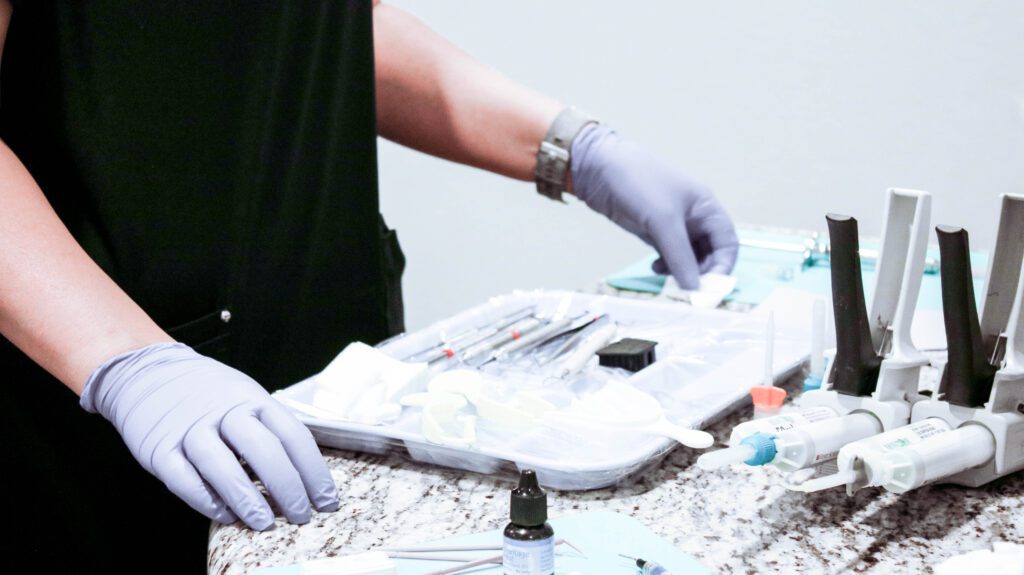At Flower Mound Dental, we’re passionate about keeping your smile healthy! We offer regular cleanings, checkups, and a full range of dental services for all in Flower Mound, TX. Our skilled dentists and caring dental hygienists work together to make sure your smile stays strong and bright.
Preventive care is a team effort between you, your dentist, and our staff. It’s all about keeping your teeth healthy and preventing problems before they start. Our dentists in Flower Mound focus on long-term oral health by stopping dental issues early on.

General Dentistry in Flower Mound, TX
Our general dental services are here to help you keep a healthy smile. With regular preventive care, you can avoid serious dental issues and prevent minor ones from becoming larger problems.
- Dental X-rays: X-rays help us see things we can’t spot in a regular exam. For example, decay between teeth or issues below the gumline. Our dental office uses digital X-rays to lower your exposure to radiation.
- Laser Dentistry: Lasers make many dental treatments go faster and less painful. We use them for a variety of general, cosmetic, and restorative treatments.
- Emergency Dentistry: Dental emergencies, like severe toothaches, broken teeth, or infections, need quick care. Our team is here to help relieve pain and fix the problem correctly the first time.
- Sedation dentistry: If you feel nervous or need a long procedure, sedation can help you stay calm and comfortable. It’s a great option for those with dental anxiety, special needs and a bad gag reflex.
- Tooth Extractions: Sometimes a tooth is too damaged to be saved. The dentist may need to remove it to protect the health of the surrounding teeth and rest of your mouth.
Why Preventive Care Matters
Preventive care is the key to a healthy smile. It’s not only less expensive than big dental procedures, but it also helps you avoid serious problems down the line. Regular visits to the dentist, along with good care at home, are the best way to keep your smile in great shape.
At home, make sure to brush your teeth twice a day and floss every day to get rid of food and bacteria. Use a soft-bristled toothbrush and fluoride toothpaste to protect your enamel. Even with good care at home, regular dental visits are important. Our tools can clean the spots that are hard to reach, and our exams help catch issues like gum disease or oral cancer early.
We also use modern technology, like X-rays and digital imaging, to find problems before they get serious. Treating issues early is always easier and less invasive.
How Diet Affects Your Oral Health
What you eat has a big impact on your teeth and gums. Here are some important nutrients and foods to include in your diet:
- Calcium and Vitamin D: These are essential for strong teeth and bones. Dairy products like milk and cheese are great sources of calcium. Sunlight gives you Vitamin D, which helps your body absorb calcium.
- Vitamin C: This vitamin keeps your gums healthy and helps your body fight infections. Citrus fruits, strawberries, and broccoli are all high in Vitamin C.
- Antioxidants: Foods like green tea and aloe vera help protect your gums by reducing inflammation.
- Fresh Fruits and Vegetables: Crunchy fruits and veggies like apples and carrots are like natural toothbrushes. They help remove food particles and boost saliva production.
You should also pay attention to foods you should limit or avoid:
- Sugary Foods: Sugar feeds the bad bacteria in your mouth, which can cause cavities. Try to limit sweets, soda, and snacks like chips and crackers.
- Acidic Foods and Drinks: Foods like citrus fruits, soda, and sports drinks can weaken your enamel. Weak enamel makes your teeth more vulnerable to decay. Try to eat these with a meal and rinse your mouth with water afterward.
Do your best to protect your teeth from sugar and acid by frequently rinsing your mouth with water. Use a straw when drinking acidic beverages to reduce their contact with your teeth. By combining regular dental visits, good care at home, and a healthy diet, you can keep your smile looking great for years!
General Dentistry FAQs
General dentistry focuses on preventing serious oral health problems. Check out these frequently asked questions to learn more.
What is general dentistry, and why is it important?
General dentistry covers a wide range of services to keep your mouth healthy. This includes regular check-ups, cleanings, fillings, and extractions. It’s important because regular dental visits catch problems early before they become more serious and harder to treat. General dentistry keeps your teeth and gums healthy for life.
How often should I visit the dentist for a check-up?
Most patients should visit the dentist every six months for a check-up and cleaning. However, patients with gum disease or frequent cavities may need to go more often. Regular visits help your dentist keep an eye on your oral health, clean your teeth, and catch any problems early.
What happens during a routine dental check-up?
At a routine check-up, your dentist will examine your teeth, gums, and mouth for any signs of issues like cavities or gum disease. You’ll also get a professional cleaning to remove plaque and tartar. The dentist takes X-rays to find any hidden problems, so you shouldn’t skip them too often. Afterward, your dentist will discuss what they found, make suggestions, and answer any questions you have.
What are dental fillings, and when are they necessary?
Dental fillings fix teeth that have cavities or decay. The dentist removes the decay and fills the space with materials like composite resin or amalgam. Fillings stop the decay from getting worse, protect the tooth, and keep it strong. The decay can cause infections or tooth loss without a filling.
How can I prevent cavities and keep my teeth healthy?
To prevent cavities, brush your teeth at least twice a day with fluoride toothpaste and floss every day to clean between your teeth. Limit sugary snacks and drinks because they can lead to cavities. Visit your dentist regularly for cleanings and check-ups. You can also use mouthwash and drink fluoridated water to help strengthen your teeth.
What should I do if I have a dental emergency, like a knocked-out tooth?
If a tooth gets knocked out, avoid touching the root and try to put it back in its socket. If that’s not possible, keep the tooth moist by placing it in milk or holding it in your mouth next to your cheek.
Contact your dentist right away. Getting treatment within an hour increases the chances of saving the tooth. For other emergencies, like severe tooth pain or a broken tooth, see a dentist as soon as you can to avoid further issues.
Schedule A Dental Appointment Today
We’d love to welcome you to our dental family. Call us at 972-691-8337 or schedule an appointment online. Our dentists at Flower Mound Dental put patients first, and will only recommend the most relevant treatments for your needs.
